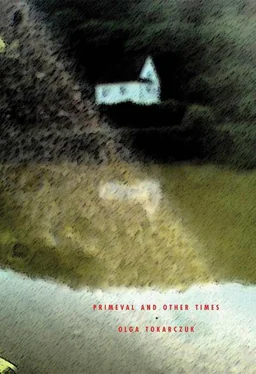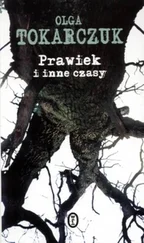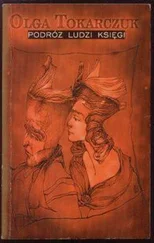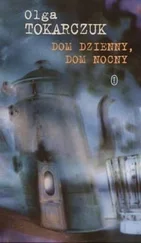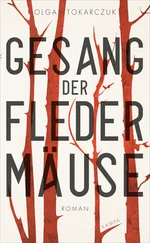Meanwhile Squire Popielski was standing by the car, enjoying inhaling the fresh air, which intoxicated him after months of being shut indoors. He felt like laughing, rejoicing, dancing – the oxygen blazed in his thick, sluggish blood and dilated his clogged arteries.
“Everything is exactly as it should be,” he told his wife in the car as they were driving along the Highway towards the Kielce road. “Everything that’s happening is turning out well.”
Then he added something else that made the driver, and the removal men, and his wife give each other meaningful looks:
“The eight of clubs has been shot dead.”
In the book entitled Ignis fatuus, or an instructive game for one player , which is the instruction manual for the Game, the description of the Fourth World includes the following story:
God created the Fourth World in a passion that brought Him relief in His divine suffering.
When He created man, He came to His senses – such an impression did he make on Him. So He stopped creating the world any further – for could there have been anything more perfect? – and now, in His divine time, He admired His own work. The deeper God’s vision reached into the human inside, the more ardently God’s love for man intensified.
But man proved ungrateful – he was busy cultivating the land and begetting children, and took no notice of God. Then in His divine mind arose sorrow, from which darkness seeped.
God’s love for man was unrequited.
Divine love, like any other, can be oppressive. Meanwhile man matured and decided to free himself from his importunate lover. “Let me leave,” he said. “Let me get to know the world in my own way and give me provisions for the journey.”
“You won’t manage without me,” God told man. “Don’t go.”
“Oh, come on,” said man, and regretfully God leaned the branch of an apple tree towards him.
God was left alone and He pined. He dreamed that it was He who had driven man out of paradise, so painful was the thought that He had been abandoned.
“Come back to me. The world is terrible and it can kill you. Look at the earthquakes, the volcanic eruptions, the fires and the floods,” He thundered from the rain clouds.
“Oh, come on, I’ll manage,” man replied, and was gone.
“You have to live,” said Paweł. “You have to bring up children, earn a living, keep on studying and climbing upwards.”
And so he did.
He and Aba Kozienicki, who had survived the concentration camp, went back to trading in timber. They bought a forest for felling and organised the cutting and transport of the wood. Paweł bought a motorbike and drove around the district in search of orders. He got himself a pigskin briefcase in which he kept a receipt book and several copying pencils.
As business was going quite well and there was a steady stream of cash flowing into his pocket, Paweł decided to continue his education. Studying to be a doctor was no longer very realistic, but he could still improve his qualifications as a health worker and paramedic. Now he spent his evenings fathoming the mysteries of how flies multiplied and the complex sequences in the life of tapeworms. He studied the vitamin content in nutritional products and the ways illnesses spread, such as tuberculosis and typhoid. Over several years of courses and training he became convinced that medicine and hygiene, once liberated from the power of ignorance and superstition, would be capable of transforming human life, and the Polish village would change into an oasis of sterilised pots and yards disinfected with Lysol. So Paweł was the first in the district to devote one room in his house to a bathroom and medical treatment room in one. It was spotlessly clean in there, with an enamelled bathtub, scrubbed taps, a metal waste bin with a lid, glass containers for cotton wool and wadding, and a glazed cabinet with a padlock, in which he kept all his medicines and medical instruments. Once he had finished the next course, he had nursing qualifications, and now in this room he gave people injections, without forgetting at the same time to give them a short lecture on the subject of everyday hygiene.
Then the business with Aba collapsed, because the forests were nationalised. Aba went away. He came to say goodbye. They embraced like brothers. Paweł Boski realised that a new stage in his life was beginning and that from now on he must manage on his own, on top of that in completely new conditions. He could not keep a family merely on giving injections.
So he packed all his certificates into his leather briefcase and rode his motorbike to Taszów to look for work. He found it at the health centre, which was the district kingdom of sterilisation and stool samples. From then on, especially after joining the Party, he gradually and irrevocably began to gain promotion.
His job involved travelling on his noisy motorbike around the neighbouring villages and inspecting the cleanliness in shops, restaurants, and bars. In all these places, his appearance, with his leather briefcase full of documents and test tubes for excrement, was regarded like the coming of a rider of the Apocalypse. If he wanted, Paweł could have any shop or eatery closed down. He was important. He was given presents, treated to vodka and the freshest jellied pig’s feet.
This was how he met Ukleja, who was the owner of a cake shop in Taszów and several other, less official businesses. Whereas Ukleja introduced Paweł to the world of secretaries and lawyers, drinking sprees and hunting, willing busty barmaids and alcohol, which provided the courage to get as much out of life as possible.
In this way, Ukleja took the place vacated by Aba Kozienicki, the place assigned in the life of every man for a friend and guide, without whom a man would be just a lonely, misunderstood warrior in a world of chaos and darkness, which creeps out from every corner the moment his back is turned.
THE TIME OF THE MUSHROOM SPAWN
The mushroom spawn grows under the entire forest, or maybe even under the whole of Primeval. In the earth under the soft forest floor, under the grass and stones, it creates a tangle of slender threads, strings and bundles, which it twines around everything. The threads of the mushroom spawn have great strength and push their way in between every clod of earth, tangle around tree roots and restrain huge boulders in their infinitely gradual onward motion. The mushroom spawn is like mould – cold, white, and delicate – underground lunar lace, damp, hem-stitched mycelia, the world’s slimy umbilical cords. It overgrows meadows and wanders under human roads, climbs the walls of people’s houses, and sometimes in surges of power it imperceptibly attacks their bodies.
The mushroom spawn is not a plant or an animal. It cannot gain strength from the sun, because its nature is alien to the sun. It is not drawn to the warm and the living, because its nature is neither warm nor alive. The mushroom spawn lives thanks to the fact that it sucks up the remains of juices from whatever dies, whatever is decaying and soaking into the earth. The mushroom spawn is the life of death, the life of decay, the life of whatever has died.
All year the mushroom spawn bears its cold, wet children, but the ones that come to light in the summer and autumn are the most beautiful. Along human paths, marasmius mushrooms grow on slender legs, near-perfect puffballs and earthballs show white in the grass, and slippery jacks and bracket fungi take crippled trees into their possession. The forest is full of yellow chanterelles, olive-green russulas, and suede boletus.
The mushroom spawn does not separate or single out its children, it gives them all the strength to grow and the power to spread their spores. To some it gives a scent, to others the capacity to hide from the human eye, yet others have shapes that are breathtaking.
Читать дальше
